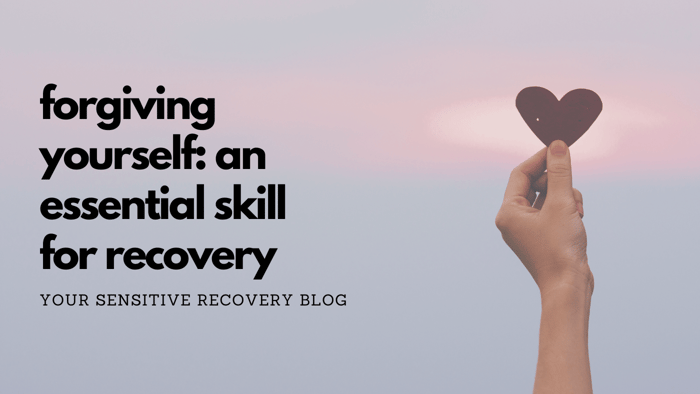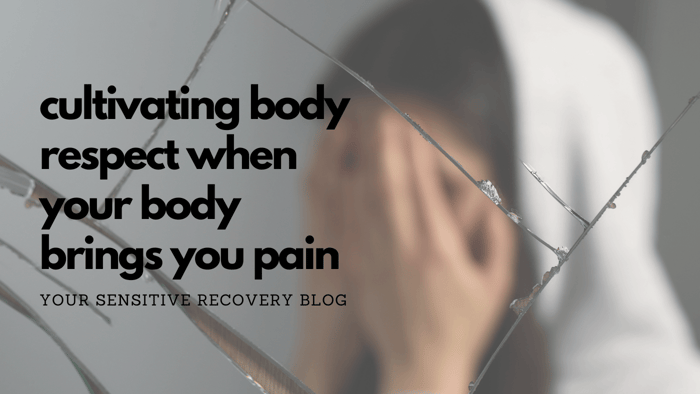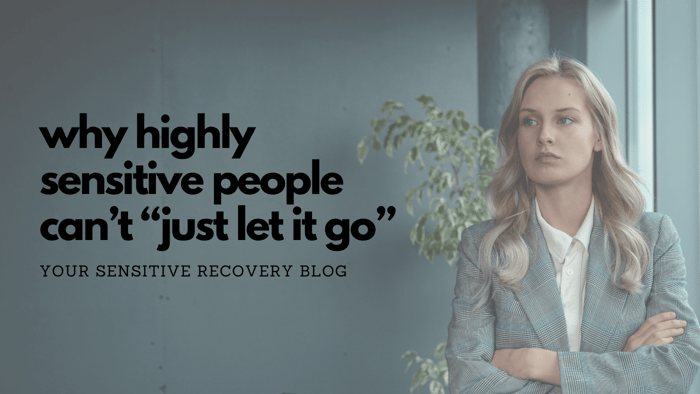If you’re in recovery, chances are you’ve had moments (maybe years) where you felt like you were failing or were undeserving of healing. Perhaps you had recurring thoughts like: “I should be further along,“ "Why did I do that again,” or “I’ve ruined everything.” Forgiving ourselves is not easy. It may feel like letting yourself off the hook or minimizing your pain. But true self-forgiveness isn’t about excusing behavior. It’s about choosing to meet yourself with compassion so that healing is even possible.
In my experience, both personally and professionally, forgiveness is an essential life skill. And this is especially true for sensitive humans who have ever struggled with an eating disorder, addiction, or any kind of situation where other people think it should be easier than it is to heal and to move forward. For those of us who often carry deep self-blame and shame, learning to forgive ourselves is the crucial key to doing just that.
Let’s explore why it’s so hard to forgive yourself, why it matters, and how you can begin to practice it today, even if it feels impossible.
Why Forgiving Yourself Feels So Hard
Highly Sensitive People tend to be very conscientious. You likely have strong values and a fierce inner drive to do the right thing.
When your actions don’t align with your ideals, like relapsing, falling back into old patterns, and engaging in behaviors you swore you'd never do again, it can feel unbearable.Here are some reasons self-forgiveness can feel so challenging:
- You have internalized shame: Shame says, “I am wrong,” while guilt says, “I did something wrong.” When we confuse the two, we believe our mistakes define us and that we don’t deserve forgiveness.
- You believe punishment is necessary for change: Many of us mistakenly believe that we can hate ourselves into positive change. But research shows that punishment rarely leads to long-term change.
- You're stuck in black-and-white thinking: Recovery isn’t linear. But if you’ve adopted an all-or-nothing mindset, setbacks feel like complete failures. This perfectionism blocks self-forgiveness.
- You've equated forgiveness with permission: If we forgive ourselves, aren't we really just giving ourselves an excuse to continue staying stuck? No way. Withholding forgiveness depletes your motivation, and that is what actually keeps you stuck.
Why Forgiveness Is Essential for Recovery
Recovery is built on a foundation of self-trust, self-compassion, and resilience. When we hold onto shame and self-blame, we’re reinforcing the same systems that the harmful behaviors developed and thrived in.
Self-forgiveness creates space for:
- Learning and growth: If you can forgive yourself, you can get curious instead of critical. You can explore what happened and what you need, rather than spiraling into shame.
- Sustainable motivation: Compassion fuels change. When you believe you're worthy of healing (mistakes and all), you're more likely to keep showing up for yourself.
- A more honest relationship with yourself: Forgiveness allows for wholeness. You no longer need to deny or justify parts of yourself. You can face your full humanity with grace.
- Reconnection with your body and emotions: Forgiveness softens a stressed-out nervous system. It helps you return to the present moment, where healing happens.
5 Steps to Begin Forgiving Yourself
Self-forgiveness is not a one-time decision but rather an ongoing practice. Here are some steps to help you begin:
1. Acknowledge what happened.
Forgiveness doesn’t mean pretending nothing happened. It means allowing yourself to name the behaviors honestly, but without judgment. Bringing clarity and compassion into the moment is the first step toward moving into the next.
Instead of: “I can’t believe I binged again. I’m such a failure.”
Try: “I had a binge last night. I was feeling overwhelmed and alone.”
2. Recognize the pain underneath.
The behaviors we hold shame around are, more often than not, attempts to cope with something difficult. What's going on emotionally? No one chooses suffering on purpose. Your behaviors made sense, given what you were feeling and what you had access to in the moment.
Self-forgiveness doesn’t ignore the consequences of our actions, but it does help us see them in context. 3. Talk to yourself like someone you love.
I often ask clients (and myself!), "Would you say that to a friend?" If not, it probably isn’t something you should say to yourself. Imagine the younger version of you who first developed the survival strategies you now have trouble forgiving. Could you offer that person understanding? What do they need to hear right now?
Maybe it sounds like:
“You were doing the best you could.”
“You didn’t deserve to go through that.”
“It makes sense that you felt scared and overwhelmed.”
4. Make room for nuance.
Recovery doesn’t require perfection. However, it requires persistence. Can you let your progress be messy? Can you be both someone who struggles and someone who’s growing?
Forgiving yourself means holding the full truth: Yes, I made a choice I regret. And yes, I’m still worthy of healing.
5. Return to the Present Moment.
Guilt and shame keep you stuck in the past. Forgiveness brings you back to now. You are not the you of yesterday. You are here, reading this, still committed to your recovery. That matters.
Try placing a hand on your heart, noticing your breath for a moment, and saying to yourself, “I am here now. I am in process.”
A Gentle Reminder
You are not a failure because you struggle. You are not broken because you make mistakes. You are not unworthy of love, rest, or healing. You don’t need to be perfect to be deserving.
Forgiving yourself isn’t a sign that you’ve given up or that you're shirking responsibility. It’s a sign that you’re choosing to keep going, but with softness instead of shame. It’s a skill you can build, one gentle moment at a time.
Real, deep, sustainable healing asks us to become our own safe place. That starts with learning to forgive the parts of us that hurt.
So be willing to begin again.
And again, and again. 💓
✨ Josie Munroe, LMFT is a licensed therapist and owner of JosieMunroe.com and Your Sensitive Recovery. As a recovered clinician and Highly Sensitive Person, she loves supporting others on their journeys to form new, empowered relationships with food, their bodies, and their sensitivity. Join the newsletter for a weekly boost of hope and inspiration. You deserve a recovery that works for you! ✨




